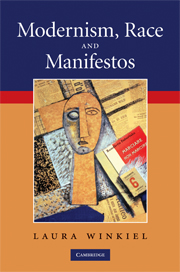Book contents
- Frontmatter
- Contents
- Acknowledgments
- Chapter 1 Introduction: manifestos, race, and modernity
- Part I COSMOPOLITAN LONDON, 1906–1914
- Chapter 2 Women's suffrage melodrama and burlesque
- Chapter 3 Futurism's music hall and India Docks
- Chapter 4 Vorticism's cabaret modernism and racial spectacle
- Part II TRANSNATIONAL MODERNISMS, 1934–1938
- Epilogue: Manifestos: then and now
- Index
Chapter 4 - Vorticism's cabaret modernism and racial spectacle
Published online by Cambridge University Press: 22 September 2009
- Frontmatter
- Contents
- Acknowledgments
- Chapter 1 Introduction: manifestos, race, and modernity
- Part I COSMOPOLITAN LONDON, 1906–1914
- Chapter 2 Women's suffrage melodrama and burlesque
- Chapter 3 Futurism's music hall and India Docks
- Chapter 4 Vorticism's cabaret modernism and racial spectacle
- Part II TRANSNATIONAL MODERNISMS, 1934–1938
- Epilogue: Manifestos: then and now
- Index
Summary
“In the state of degeneracy, in which we live, it is through the skin that metaphysics will be made to reenter our minds.”
Antonin Artaud“Futurism, as preached by Marinetti, is largely Impressionism up-to-date. To this is added his Automobilism and Nietzsche stunt. With a lot of good sense and vitality at his disposal, he hammers away in the blatant mechanism of his Manifestoes, at his idée fixe of Modernity.”
Wyndham LewisThe prewar English avant-garde group the Vorticists published their founding manifesto, written by Wyndham Lewis in collaboration with Ezra Pound, in the first issue of the little magazine, Blast. Unlike the manifestos I have discussed so far, Lewis's manifesto advocates critical consciousness instead of action, a tense stasis rather than the forward momentum of action. This stasis derives from vorticism's ambivalence concerning modernity. This ambivalence occurs in the second quotation above, as Lewis condemns Marinetti for doing little more than advance an already existent modernity: his manifestos repeat the past without transforming it. In particular, Lewis excoriates Marinetti for his “Automobilism and Nietzsche stunt.” For Lewis, even avant-garde iconoclasm is grist for the entertainment mill of modernity. While more critical of modernity than Marinetti, Lewis deploys racial myths in ways that often dovetail with Marinetti's racial and imperial vision of modernity.
- Type
- Chapter
- Information
- Modernism, Race and Manifestos , pp. 121 - 154Publisher: Cambridge University PressPrint publication year: 2008



